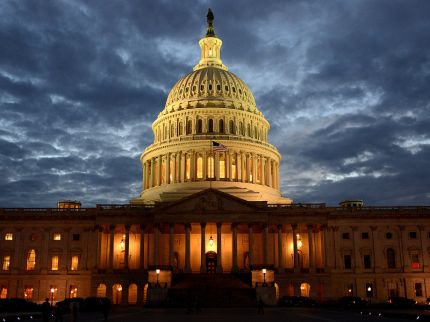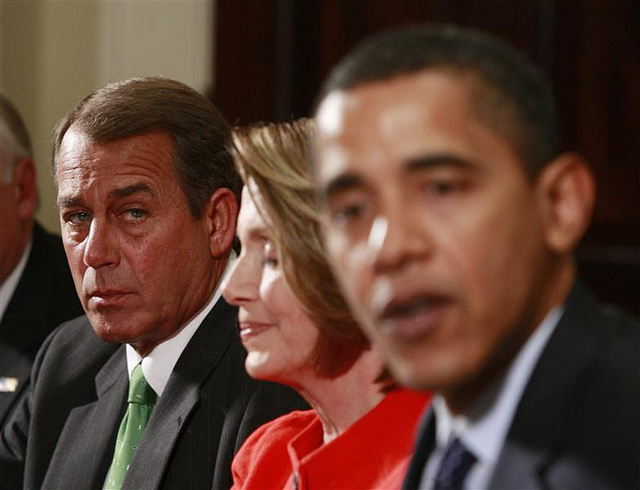
Throughout the year headlines were abuzz with tales of an “immigration crisis” in the US. But when Congress failed to pass comprehensive immigration reform before their summer recess, that crisis went into a tail spin. Making matters worse – in addition to Congress’s failure to pass a reform bill – was the flooding of unaccompanied, undocumented minors from Central America and Mexico across the US-Mexico border. This surge is overwhelming an already burdened system with no relief in sight. Without congressional action, the White House is left to examine how the President may take unilateral action to address at least some of these many complex issues. What follows is an overview of the major immigration issues the US is facing and where those issues stand.
IMMIGRATION REFORM: DOA
In mid-2013 things were beginning to look hopeful for immigration reform. A bipartisan bill had been drafted and passed through the Senate which provided for enhanced border security and interior enforcement, and granted legal status to over 11 million undocumented immigrants within the United States. It also required additional due process protections for particularly vulnerable individuals during removal proceedings, and raised the annual H1-B visa cap for highly skilled workers.
Later in the year, a House bill based on S.744 was introduced which replaced the highly criticized Corker-Hoeven border security amendment with a bipartisan House border security bill. For eight months after this the House sent mixed signals on the future of the bill. But, as the one year anniversary of the Senate’s passing of the bill rolled around, it became clear that the reform was effectively dead. By the end of June, Congress members from both sides of the aisle were claiming defeat. Not only was the reform declared dead for this legislative term, but lawmakers signaled it was unlikely to be revived until after President Obama left office.How did this happen after an almost two-year bipartisan push for much needed immigration reform? Two recent developments were to blame. First was the Primary election loss of former House Majority Leader Eric Cantor to a Tea Party-backed candidate who ran on a strong anti-immigration platform. This signaled to some lawmakers that showing even a slight openness to pro-immigration measures could lead to defeat; others suggested that Cantor’s loss was due to his flip-flopping on such a politically charged issue. The second major factor was the emerging crisis at the Mexican border.
CRISIS AT THE BORDER – A DEEPER LOOK
Within the past year there has been a huge surge in the number of unaccompanied, undocumented minors attempting to cross the US-Mexico border. Since October of 2013, more than 52,000 undocumented minors have been taken into custody by US Border Patrol officials. This surprising flood of minors has been so great that the Department of Health and Human Services (“HHS”) is hard-pressed to find facilities to house these minors while their cases are being reviewed.
PERSPECTIVEBefore 2012 HHS normally handled roughly 7,500 children a year.It is estimated by the end of this fiscal year, HHS will have handled 90,000 unaccompanied minors. |
The question is: Why are so many unaccompanied minors coming to the US so suddenly? A variety of factors are at work:
- With a spike in violence in Central America, 58% of the minors are fleeing violence and harm (“persecution, abuse, or trafficking”) in their home countries.
- An internal Border Patrol intelligence memo indicates that the children are coming to the US in hopes that they will be given a “notice to appear” specifying a court date for deportation proceedings (sometimes up to three years in the future) and then released in the US until that time.
- It has been suggested that President Obama’s 2012 decision to defer the deportation of “dreamers” – young adults who were brought to the US illegally as children – is to blame. While the decision only applied to undocumented minors who were in the US when the program was announced in 2012, it is possible that many families are sending their children in hopes they will be given similar treatment.
73% of the minors arriving are from Central America (compare this to 2012 when 75% of the unaccompanied minors were arriving from Mexico) and thus, extra protections apply to them. While US policy allows Mexican children to quickly be returned home, a 2008 law called the Trafficking Victims Protection Reauthorization Act requires that children from Central America be given extra protections before they are returned to their home countries. It can currently take three years for a child protected under this law to actually have an immigration hearing. With the deluge of Central American minors crossing the border and requiring these special protections, the delays are likely to worsen.Although the President had previously referred to the flood of children as a “humanitarian crisis,” more recent comments from the White House signaled that most of the minors would be returned home.
UNILATERAL ACTION
As we enter August, the month that had once been referred to as the “deadline” for reform passage, the immigration crisis is at its breaking point. Without help from Congress, President Obama is left to act alone. Press Secretary Josh Earnest announced in mid-July that White House attorneys were examining what executive action the President could take. While Earnest was mum on the details of this action, others have implied the President might use executive action to reduce the backlog of H1-B visas by raising the threshold to allow more foreign high-skilled workers into the US. It is also thought that the administration may expand the DACA program to include qualifying family members of children who qualified for the deferred action. Earnest did say the President hoped to “level the playing field” for business owners who rigorously observed current immigration laws. He explained that these businesses were unfairly losing out to businesses that bypassed the system by hiring cheaper, undocumented labor. Of course unilateral action does not come without a cost. House Speaker John Boehner announced that he is bringing suit against the President for abusing executive action and “not faithfully execut[ing] the laws.” The suit includes the President’s executive actions on immigration. The House will vote on the suit by the end of July.In spite of the suit, the President is expected to announce his unilateral action at the end of the summer. In the meantime he has asked Congress for $3.7 billion in emergency funding to address the crisis at the border. The request includes $300 million to the State Department which would go towards helping to “repatriate and reintegrate migrants to Central America” as well as addressing the underlying economic and security concerns that caused the children to migrate in the first place. The proposal is currently under review.
Of course unilateral action does not come without a cost. House Speaker John Boehner announced that he is bringing suit against the President for abusing executive action and “not faithfully execut[ing] the laws.” The suit includes the President’s executive actions on immigration. The House will vote on the suit by the end of July.In spite of the suit, the President is expected to announce his unilateral action at the end of the summer. In the meantime he has asked Congress for $3.7 billion in emergency funding to address the crisis at the border. The request includes $300 million to the State Department which would go towards helping to “repatriate and reintegrate migrants to Central America” as well as addressing the underlying economic and security concerns that caused the children to migrate in the first place. The proposal is currently under review.
A LEGACY ON THE LINE
Despite the political discord and Congress’s inaction, a majority of Americans continue to support immigration reform. A survey conducted by the Public Religion Institute and the Brookings Institute found that 62% of Americans favored a pathway to citizenship for undocumented immigrants living in the US and 68% of Americans favored allowing “Dreamers” to gain legal status. Not surprisingly, a majority of the Americans surveyed believe the immigration system in the US is broken. The sad reality is that the system is broken, the crisis on the border is worsening, and the government is struggling to find a solution.As this struggle continues, President Obama’s approval rating has plummeted. Frank Sharry, the executive director of the immigration lobby group America’s Voice explained, “Obama’s legacy’s on the line. Does he really want to go down as the ‘deporter in chief,’ and the only thing that happened during his second term was beefed-up enforcement and deportations? He’s the president. He’s got to take action.”With the President’s emergency funding request, Speaker Boehner’s lawsuit, and the HUMANE Act all under consideration in Congress, we are left waiting to see what, if any, that action will be.

